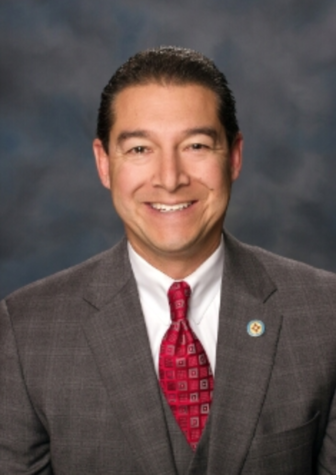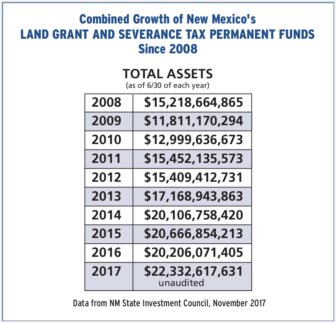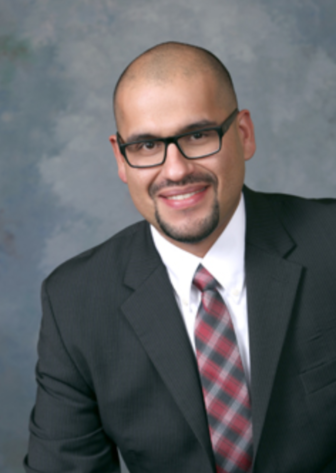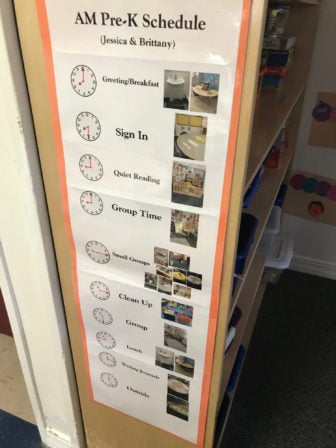New Mexico’s children have arguably taken the brunt as the state has struggled through tough budgets the past couple of years, with cuts to public schools, state colleges and programs such as home visiting and expanded school years.
But with oil and gas revenues re-bounding, could 2018 be the year of the child at the Roundhouse?
State legislators are likely to reverse course on spending cuts when they meet to hammer out a budget for 2018-19 that might have between $200 million and $300 million in unanticipated revenue, although uncertainties, including how the new federal tax law affects the state’s taxpayers, could change that.
Two departments are seeking a $60 million chunk of that money to pay for children’s health insurance and child-care assistance. In addition, Democratic lawmakers are reintroducing bills they’ve carried in the past that would tap two large funds to pay for early childhood education programs.
 “The Legislature, both chambers and both sides of the aisle, recognize we need to prioritize our earlier childhood funding and feel bad that we were forced to reduce these areas’ funding in the last session,” said Sen. John Sapien, D-Corrales, who is seeking support for his proposal to take about $35 million annually from the Severance Tax Permanent Fund to pay for programs that target children from birth to age 3, a period of rapid brain development.
“The Legislature, both chambers and both sides of the aisle, recognize we need to prioritize our earlier childhood funding and feel bad that we were forced to reduce these areas’ funding in the last session,” said Sen. John Sapien, D-Corrales, who is seeking support for his proposal to take about $35 million annually from the Severance Tax Permanent Fund to pay for programs that target children from birth to age 3, a period of rapid brain development.
State agency requests
The biggest ticket items will likely have the most bipartisan support. In September, Congress allowed funding for the Children’s Health Insurance Program to lapse and has spent much of its time since then working on a massive overhaul of the federal tax code. Lawmakers on Dec. 22 approved stop-gap funding for the program as part of a bill to avoid a government shutdown, but its long-term renewal is up in the air until Congress returns to work in January.
CHIP covers children from lower and middle-income families that make too much to qualify for Medicaid but not enough to buy private insurance. In a Dec. 6 presentation, state Human Services Secretary Brent Earnest said the department is seeking $30.7 million to cover more than 11,300 children in the event Congress does not appropriate money for the program.
The Children Youth and Families Department is seeking $25 million just to keep its child-care assistance program going at the current level. An increase in state reimbursement rates to child-care providers and a new, 12-month renewal period has kept children enrolled in child-care centers more consistently, straining the program. The number of families served by child-care assistance has risen, with 20,871 children using childcare subsidies in September.
 “CYFD says that they need that $25 million. I think that should be a priority because the Child Care Development Block Grant serves low-income, at-risk families while they are working and going to school,” said Rep. Rebecca Dow, R-Truth or Consequences, an early childhood educator and consultant. “It targets families who need it. It has a two-generation impact — sends kids to school ready and helps us with our workforce.”
“CYFD says that they need that $25 million. I think that should be a priority because the Child Care Development Block Grant serves low-income, at-risk families while they are working and going to school,” said Rep. Rebecca Dow, R-Truth or Consequences, an early childhood educator and consultant. “It targets families who need it. It has a two-generation impact — sends kids to school ready and helps us with our workforce.”
She pointed out the money the state spends in child-care assistance is a good way to leverage federal dollars, because about two-thirds of the money comes from federal grants and Temporary Assistance for Needy Families. “I’m all for maximizing the federal allocation.”
Sen. John Arthur Smith, D-Deming, chairman of the powerful Senate Finance Committee, praised CYFD Secretary Monique Jacobson’s work in restructuring the department in an interview with New Mexico In Depth, and was supportive of her requests.
“I don’t know that we’ll fund it at $25 (million), because we’re still spread thin, but I can see a good chunk of it at $20 million or so going into it,” he said.
Permanent funds
 The ideological wars over how to improve New Mexico’s 50th place standing in education will return to the Roundhouse in the Public Education Department’s budget request and in two bills that are resurfacing to take money from the Land Grant Permanent Fund and the Severance Tax Permanent Fund to use for early childhood education.
The ideological wars over how to improve New Mexico’s 50th place standing in education will return to the Roundhouse in the Public Education Department’s budget request and in two bills that are resurfacing to take money from the Land Grant Permanent Fund and the Severance Tax Permanent Fund to use for early childhood education.
Despite a lawsuit this year against the PED that claims the state has been underfunding New Mexico publics chools to the tune of $600 million per year, the department is asking for a flat budget. That comes despite cuts to school budgets in recent years, and the sweeping of reserve funds by the state to help balance the budget and inflation. In effect, the money PED is seeking would be a budget cut and it takes a whack even at programs the department touts, such as Read to Lead. It proposes only a slight bump to K-3 Plus, a program that adds 25days to the school year and which in combination with preschool, has been shown to reduce the education gap for low-income children. The program lost about 4,000 slots over the summer because of the budget problems.
PED Secretary-designate Christopher Ruszkowski has continued policies started under former Secretary Hanna Skandera that emphasize school and teacher accountability, judged in large part by student improvements on standardized tests. He also has advocated school choice and charter schools. In testimony during the trial against the PED, Ruszkowski characterized the plaintiff’s argument that poverty drives poor educational outcomes as “the soft bigotry of low expectations.”
In contrast, many Democratic lawmakers are pinning hopes for a turnaround in education on infusions of money into early childhood initiatives. With the state’s limited resources, they are looking to the state’s two “permanent” endowments as the way to achieve their goal.
The Land Grant fund is worth$16.9 billion and Severance Fund is worth $5 billion, and both get much of their revenues from the oil and gas industry, as well as from investment of that income. Each year 5 percent of the Land Grant fund and 4.7 percent of the Severance Tax fund are distributed to fund education and other state needs. As the funds grow, so does that distribution.
The argument against tapping the funds — and an argument that has won out with Republicans and conservative Democrats in the state —has been that they provide a level of stability to the state budget that is a hedge against the volatile oil and gas industry. It’s been that volatility, and the cutback of federal spending in the state, that have caused much of the state’s budget problems.
The counter-argument is that the permanent funds are a rainy-day fund, and that monsoon rains are falling on education in New Mexico.
 Democrats Javier Martinez and Antonio “Moe” Maestas, both of Albuquerque, have filed House Joint Resolution 1, an amendment to the state Constitution that would take an additional 1 percent distribution of the Land Grant Permanent Fund for schools and early childhood education, with all of that money dedicated to early childhood beginning in 2022.
Democrats Javier Martinez and Antonio “Moe” Maestas, both of Albuquerque, have filed House Joint Resolution 1, an amendment to the state Constitution that would take an additional 1 percent distribution of the Land Grant Permanent Fund for schools and early childhood education, with all of that money dedicated to early childhood beginning in 2022.
That extra 1 percent would generate about $130 million to $150 million per year.
“It goes to quality early education services, which includes pre-K, which includes childcare subsidies, which includes home visitation, which includes any other type of intervention service that a kid might need between the age of 0 and 5,” Martinez said.
The bill would create a ballot question for voters on the extra distribution and would not require Gov. Susana Martinez’s approval.
A similar measure passed the state House in 2017, but went nowhere in the Senate. It’ll face opposition in that chamber again from Smith and other legislators worried about the fund’s long-term health, and where and how the money would be spent.
Still, Javier Martinez is hopeful the bill will gain traction in this year’s session.
“I think the Senate is moving in our direction,” he said. “I think with all the transitions coming next year, politically, we’ve already seen several of the gubernatorial candidates coming out in support of this proposal. Candidates for land commissioner have come out in support of this proposal. I think the political winds are shifting here.”
When pressed about the difficulty of using permanent fund money and its likelihood of getting through the Senate, Martinez said he’d be open to considering Sapien’s effort to tap the smaller Severance Tax fund, which has gathered some support from more conservative legislators.
“As an advocate for early ed, I think any money we can get is very much welcome,” he said. “But as a member of the House Tax and Revenue Committee, I have seen the Severance Tax fund, and that fund is not in very good shape.”
He believes the Land Grant is a better vehicle for paying for early childhood efforts because the fund gets its money from both ongoing oil and gas revenues and Wall Street investments, and even with the additional withdrawals, it would continue to grow. And, the Land Grant fund has always been dedicated to education, which is not the case with the Severance Tax fund.

Sylvia Ulloa / New Mexico In Depth
The New Mexico PreK schedule at Alpha School in Las Cruces.
Tapping either fund draws strong opposition from Smith, the powerful chairman of the Senate Finance Committee. He has long been a defender of the funds as a fiscal conservative who worries about draining one of the few sources of steady income New Mexico residents can count on. He dismissed Sapien’s bill, and agreed with Javier Martinez on the health of the Severance Tax fund. The demands on it are already too great, he said, with money being diverted from it in the first place, and other money siphoned off for tribal and colonias projects sitting unused.
The two permanent funds added nearly $900 million to the state’s general fund in fiscal 2018, according to the State Investment Council, which manages the fund.
“As those funds grow, we got an additional $63 million this year, according to the Land Office. That revenue stream has been far more reliable than oil and gas the last two years,” Smith said.
Trend line over early childhood spending
Smith wants to make clear that the Legislature has put serious money behind early childhood programs in New Mexico, even during difficult budgetary times. Funding for early childhood programs such as childcare assistance, home visiting and pre-K went from about $140 million in 2012 to about $240 million in 2017. All told, between state and federal dollars, more than $300 million will be spent annually on early childhood efforts, Smith said. Smith, whom some view as opposed to additional early childhood education spending, pointed out he was the sponsor of full-day kindergarten. What he hopes to see is quality programs and a well-thought-out expansion.
“It’s not as if it (early childhood)has been denied,” he said. “The issue at hand, and Children Youth and Families is speaking to it, and the Public Education Department is speaking to it, they’re finally talking about quality programs. Now, if you just want raw numbers to improve the numbers, that’s one thing, but if you want quality programs you have to have the trained personnel.” The question that will be debated among legislators, educators and child wellbeing advocates is whether even $300 million will be enough to change the outcomes for children and education in New Mexico.
2018 legislative session: A look at critical issues before state lawmakers
———————————————————————————
Your support makes in depth, investigative journalism possible
